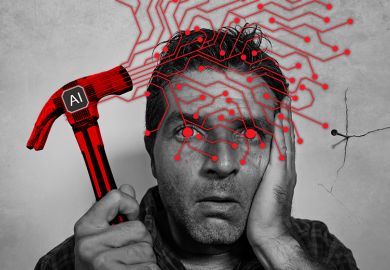Students who want to let rip at their lecturers in anonymous feedback forms should remember one thing before they start: their tutors will probably know who they are.
That was the warning from Darren Reid, senior lecturer in history at Coventry University, who reminded his class that it was fairly easy to work out who had made certain comments if they were “highly consistent with your speaking pattern” and “opinions” expressed in seminars.
In an email to students that was passed to Times Higher Education, Dr Reid urges them “not to assume that a nameless form grants you complete anonymity”, adding that “some of you think you are better at hiding your identity than you are in reality”.
“Patterns of identity” such as non-attendance and a “few other tells” mean that students often “effectively de-anonymise[d]” themselves, he adds.
Dr Reid says that his “last lesson” to his third-year students is meant “in the spirit of support” to help them “after graduation [and] in the job market”, adding that “you have absolutely nothing to worry about from me”.
Search our global database for higher education jobs
However, one student, who did not wish to be identified, told THE that he believed the message was designed to make some students “feel bad” and “worry them [by implying that he knew] who is responsible for each element of the feedback”.
Dr Reid’s seven-page response to various positive and negative comments that he had received, which was attached to the email, was also criticised by the student.
The complaint is likely to stoke debate about universities’ use of anonymous student feedback, which, along with student satisfaction surveys, has increasingly been seen as a proxy for teaching quality. However, some lecturers have complained that they tend to generate unfair, unconstructive and sometimes abusive comments that unduly affect careers.
In the case of Dr Reid, he tells students that he was “extremely flattered and gratified” by the feedback that he received and that the comments, and 94 per cent satisfaction level, had “made my day”.
In a statement, Dr Reid told THE that he wrote the email because it was “very important to discuss with students how the nature of anonymity continues to change in the digital landscape that we live in and which appears (but often fails) to protect one’s privacy”.
“We have a responsibility to make sure our students understand that perceived anonymity is not the same as actual anonymity – at university, the workplace and online,” he said, adding that “data which we assume to be safe or private has been repeatedly shown to be anything but”.
“I was simply offering constructive advice pertinent in the age of internet ‘privacy’ – nothing more, nothing less,” he said.
POSTSCRIPT:
Print headline: Your feedback betrays you
Register to continue
Why register?
- Registration is free and only takes a moment
- Once registered, you can read 3 articles a month
- Sign up for our newsletter
Subscribe
Or subscribe for unlimited access to:
- Unlimited access to news, views, insights & reviews
- Digital editions
- Digital access to THE’s university and college rankings analysis
Already registered or a current subscriber?










